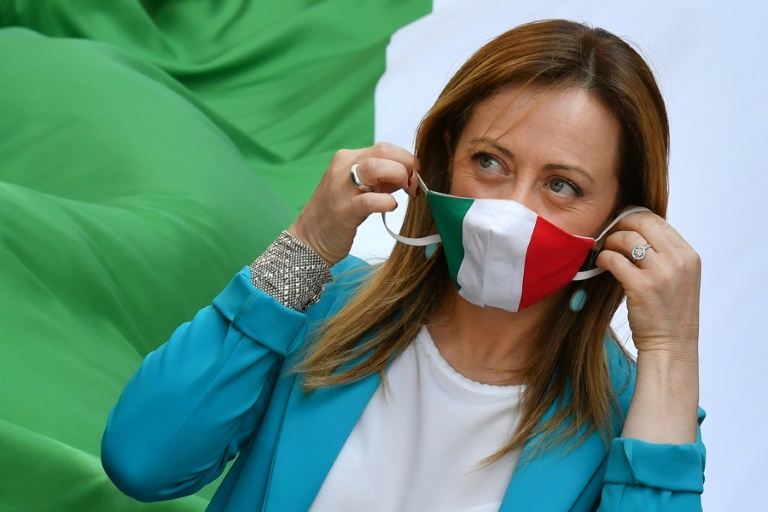Almost all of Italy’s political parties rallied behind Mario Draghi when he became prime minister — but the public seems to be falling for his biggest critic, the far-right leader Georgia Meloni.
A straight-talking conservative who has embraced the fascist-era slogan of “God, Homeland and Family”, Meloni and her Brothers of Italy (FDI) are close to overtaking Matteo Salvini’s anti-immigration League as the most popular party in opinion polls.
Her success — recent surveys put her party at around 20 percent — raises the prospect that the next elections will produce the most right-wing government in Italy’s postwar history, with FDI in the driving seat.
The next general election is not due until 2023, and technocrat Draghi is still the country’s most popular politician, but Meloni has made no secret of her ambitions.
“I am not afraid, in the sense of being ready to do what the Italians are asking me to do,” she told RAI television last month.
– No ‘cult of fascism’ –
FDI has benefitted from being the only major party opposed to Draghi’s national unity government, which stretches from left to right of the political spectrum, including the League.
“As the sole opposition party, you get more airtime and above all, you can say things that parties in the coalition cannot,” Wolfango Piccoli, co-president of the Teneo political consultancy, told AFP.
Meloni, 44, has led criticism of coronavirus restrictions, which she sees as excessive, and has lambasted the government’s failure to stop migrants landing in Italy from North Africa.
According to Piccoli, she is mostly picking up votes from the League, whose leader Salvini can no longer ride on anti-establishment sentiment since his party gained a place in the cabinet.
The FDI, which takes its name from the opening lines of the Italian national anthem, has surged past the populist Five Star Movement and the centre-left Democratic Party, and is a couple of points off the League.
Meloni portrays herself as a champion of patriotism and traditional Christian values, which she sees endangered by “globalist” elites and the gay rights movement, and an enemy of political correctness.
She is media-savvy and recently published a best-selling autobiography, “I am Giorgia”, in which she opens up on a series of personal traumas, including growing up without a father who left her mother before she was born.
Meloni wrote that she “does not belong to the cult of fascism”, yet expressed sympathy for all the neo-Fascists who were killed in the political violence that wracked Italy in the 1970s.
Her book — whose title nods to a Meloni speech that went viral after it was remixed into an unlikely dance anthem — has earned her huge publicity, also through controversy over her alleged fascist allegiances.
In Rome, a leftist bookshop refused to stock it, while a Venice university professor caused an uproar by tweeting a picture of its front cover upside down — an apparent reference to the hanging of Benito Mussolini’s upside-down body after his death in 1945.
– ‘Bit of cleaning up’ –
Meloni grew up in the left-wing working-class Roman neighbourhood of Garbatella, and joined as a teen the youth wing of the Italian Social Movement (MSI), a now-defunct party founded by diehard Mussolini fans after World War II.
She remains a polarising figure, but according to Marco Tarchi, a political science professor from Florence university with a distant past in far-right politics, that is no obstacle to her popularity.
People like “the radical nature of some of her positions, for example on immigration and the traditional family, and like the way in which she expresses them,” Tarchi told AFP.
“She knows she cannot appeal to all Italians,” he said, but “she speaks quite clearly” to right-wing voters who he believes are in the majority.
Tarchi added: “She’s a woman, moreover still relatively young, and in an age where feminism and youthfulness are dominant, this helps.”
Meloni also has past government experience — she served as a minister under prime minister Silvio Berlusconi between 2008 and 2011.
In Europe, she is allied with far-right or nationalist forces such as Vox in Spain and Poland’s governing Law and Justice party, and is a fan of former US president Donald Trump.
Despite intensive media speculation that Meloni could become Italy’s first female premier, experts urge caution.
Piccoli warned that the FDI still needed “a bit of cleaning up” from its post-fascist roots, and warned she had no credible team behind her.
“In Italy, we have seen that political fortunes can turn very quickly,” he said.










